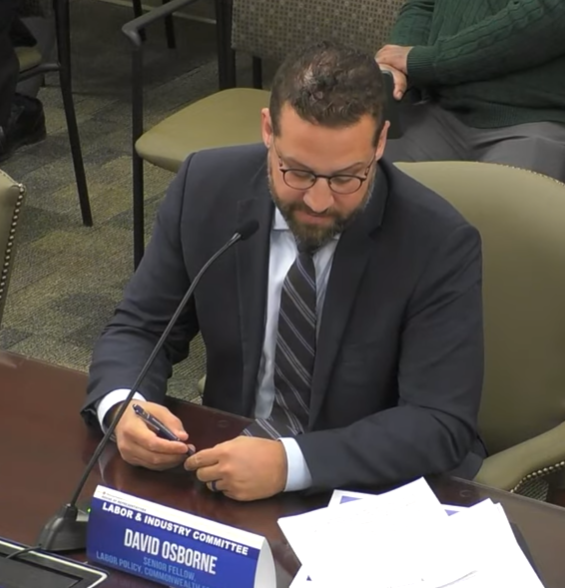*News Update*
On May 1, 2023, the Pennsylvania House of Representatives Labor and Industry Committee passed H.B. 950 by a 12-9 vote. The bill now moves to the House of Representatives as the next step in the legislative process.
But the bill’s passage presents hurdles for worker freedom. In the words of AFFT Senior Counsel David Osborne, “HB 950 is about union executives amassing power, not protecting worker rights,” He added, “The bill constitutionalizes nearly everything union executives do—from unending strikes, coercion of members, or even destruction of property. These unaccountable but powerful executives would, for the first time, be above the law.”
The Pennsylvania House of Representatives Labor and Industry Committee held a hearing this week concerning a proposed constitutional amendment, known as House Bill 950, which would enshrine collective bargaining in the Pennsylvania Constitution.
The hearing included a panel of four supporters, a mix of union leaders and members; there was just one citizen invited for the opposition panel.
Rep. Jason Dawkins (D-Philadelphia), who opened the hearing, set the tone: “We were dead set serious when we talked about this committee becoming serious about these issues. We are no longer going to ignore the elephant in the room.” He added, “We deserve better, our workers deserve better, and our workers deserve the opportunity for fair wages and fair safety standards in our communities and our workplaces.”
Later, Dawkins informed AFL-CIO Pennsylvania President, Angela Ferritto, that he is on her side, “One thing I can assure you …we will not have any anti-union bills in this committee as long as I am chairman.”
Rep. Nick Pisciottano (D-Allegheny) also praised unions during the hearing, claiming that unions are an example of democracy because “every single union was certified by majority vote” of union members and “every single labor official is elected by the voters that they represent.”
But Pisciottano did not provide evidence to support his claims.
During her testimony, AFL-CIO Pennsylvania President Angela Ferritto asserted that union members create “a pathway to a more secure retirement compared to their non-union counterparts,” but did not acknowledge that unions have mismanaged pensions and retirement funds in recent years which led to a pension fund bailout by the federal government.
Ferritto then told the committee that unions “have seen a wholesale slate of anti-worker, anti-union bills referred to this committee… Fortunately, they’ve generally been defeated with bipartisan opposition.”
When asked by the committee chair to describe benefits of joining a union, Ferritto said, “The important thing to remember that everything in that contract becomes legally binding… You’re not at the whim, at the disposal, of the employer.”
The union president later claimed, in a response to a question about the right to not join a union, “Unions have not been fighting to make people belong, if they don’t want to.”
Her claim does not stand up to the realities on the ground for AFFT members, many of whom have been harassed about leaving their union.
When asked by Rep. David Rowe about the causes of plummeting public sector union membership, Ferritto stalled, “I can’t answer that.” Rowe likely was referring to federal government data, which showed that public sector union membership declined to a new historic low of 10% in 2022.
The panel opposing the amendment was rushed at the end of the hearing, where AFFT Senior Counsel David Osborne had about a minute to testify about his concerns with the proposed bill. Osborne told the committee, “In voting for [the amendment], you are waiving your right to legislate at least one very important realm of human life.”
“This amendment,” Osborne said, “opens a door that you cannot close.” He pointed out that “for many private sector employees … this bill would do absolutely nothing” for workers because Pennsylvania would defer to federal labor law even if the bill was passed. Osborne added, “Pennsylvania is already a compulsory union state.”
Osborne’s testimony capped a back-and-forth committee hearing, where unions made claims and statements that went unchallenged. But the hearing highlighted the importance of remaining aware of union machinations in politics.
